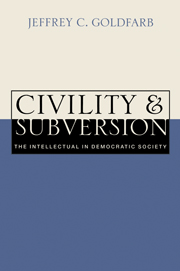Book contents
- Frontmatter
- Contents
- Acknowledgments
- 1 Introduction: the intellectuals at century's end
- 2 Who are the intellectuals?
- 3 The civil intellectual and the public
- 4 The subversive intellectual and the public
- 5 The civil society ideal
- 6 The intellectuals and the politics of culture after communism
- 7 The university
- 8 Race and discursive disruption
- 9 Race and sustained deliberation
- 10 Why is there no feminism after communism?
- 11 Civility and subversion in cynical times
- Notes
- Bibliography
- Index
4 - The subversive intellectual and the public
Published online by Cambridge University Press: 06 July 2010
- Frontmatter
- Contents
- Acknowledgments
- 1 Introduction: the intellectuals at century's end
- 2 Who are the intellectuals?
- 3 The civil intellectual and the public
- 4 The subversive intellectual and the public
- 5 The civil society ideal
- 6 The intellectuals and the politics of culture after communism
- 7 The university
- 8 Race and discursive disruption
- 9 Race and sustained deliberation
- 10 Why is there no feminism after communism?
- 11 Civility and subversion in cynical times
- Notes
- Bibliography
- Index
Summary
Walter Lippmann and John Dewey both knew that there was something fundamentally wrong with public life in their day. They faced the fundamental dilemmas of intellectuals in modern democratic society, and they were early critics of the effects of mass media on American public life. They proposed radically different explanations for how the “eclipse of the public” came about, and considered radically different solutions to the problem. Lippmann turned to a scientistic elitism for the solution, while Dewey turned to radical democracy. Yet, despite these opposing positions, these men shared a lot. They were gentlemen. They imagined social and political life to be a gentlemanly affair, bounded by norms of civility. Lippmann was a contented realist; Dewey a contented idealist. Missing from Lippmann's and Dewey's analysis is a critique of power; also missing is a sense that sometimes disagreements in democracies are articulated in a rude fashion. We now turn, then, to the question of power and the appreciation of the limits of civility, and consider how these shape the life of the intellectual in democratic society. A logical starting point is the work of C. Wright Mills, a man who was a student of pragmatism, Dewey's philosophic orientation, and a harsh critic of conservatism, Lippmann's political orientation and personal disposition.
- Type
- Chapter
- Information
- Civility and SubversionThe Intellectual in Democratic Society, pp. 56 - 77Publisher: Cambridge University PressPrint publication year: 1998



